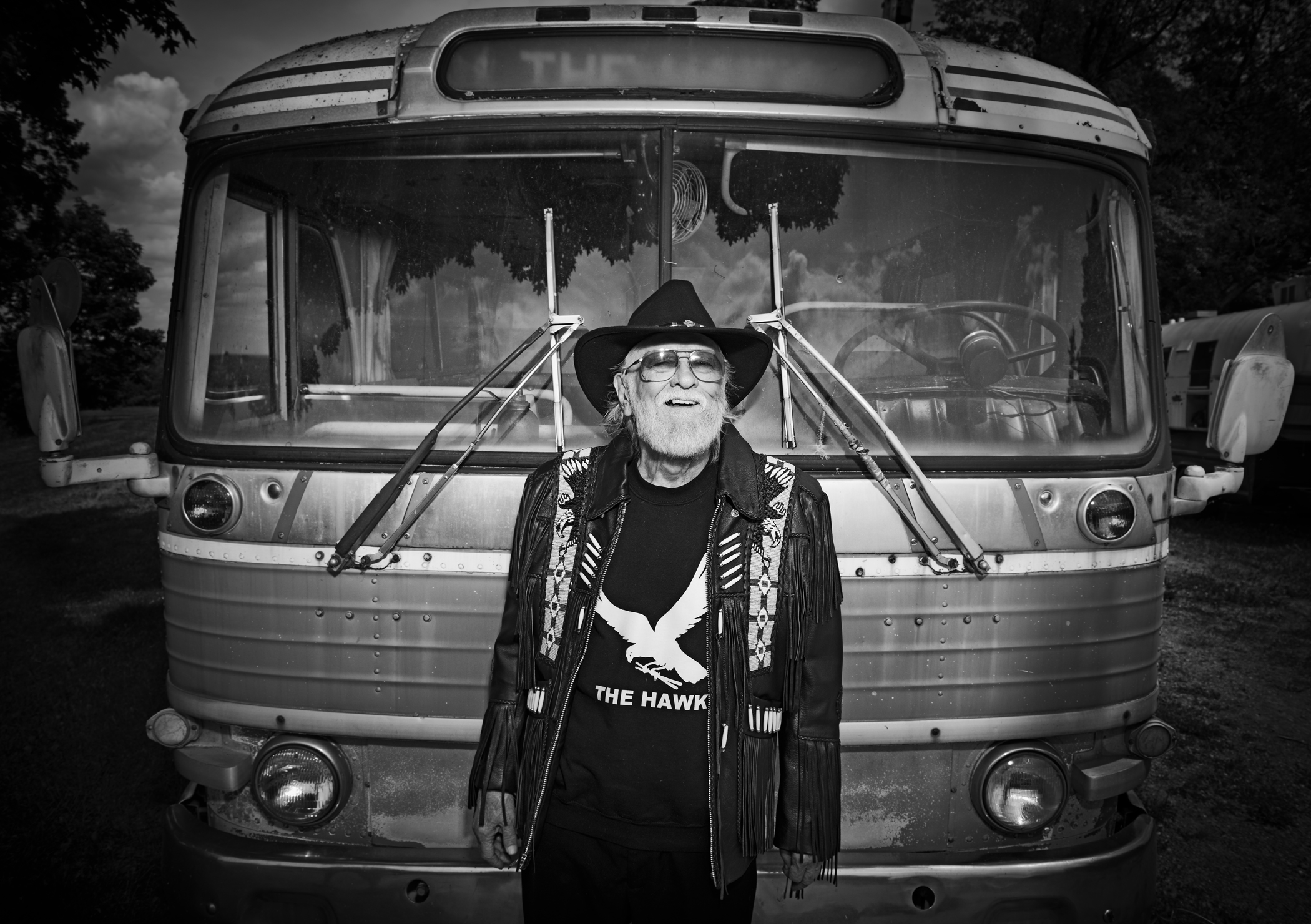
By Dylan-Thomas Childs | Photos Matt Barnes | Styling Debbie Asquith | Grooming Jon Roth-Crows Nest
Ronnie Hawkins. It is a name that should reverberate deafeningly in the hallowed halls of rock and roll but is decidedly under acknowledged and appreciated outside of Canada. It has outlived many but has outshone few of those he has called cohort and collaborator, in a career spanning some five decades. Hawkins-alumni includes, most notably, The Band and he has been able to count the likes of Kris Kristofferson, John Lennon, Gordon Lightfoot and Jerry Lee Lewis as either chum or colleague.
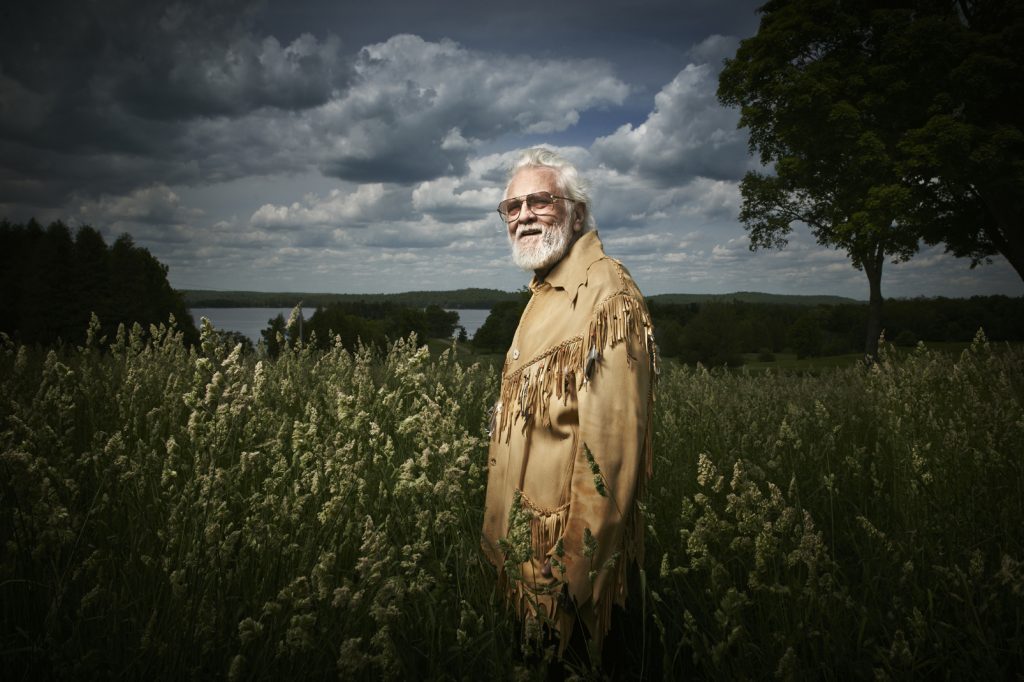
A native of Arkansas, Hawkins came to Canada under counsel from Conway Twitty – then a budding rockabilly singer, performing under his given name of Harold Jenkins. Sirened by the hum of neon lights on Yonge Street in Toronto, once considered a musical Mecca before the influx of x-rated establishments and shoddy storefronts, Hawkins carved out both a formidable livelihood and reputation as a top showman in the burgeoning days of rock and roll, enjoying a residency at the famed Le Coq d’Or nightclub. Eschewing studio work and the chart success it yields in favour of the toil and graft of gigging around Ontario, Ronnie became the consummate performer, writhing and wriggling in a style akin to Elvis. Backflips, go-go dancers, and an early incarnation of the moonwalk, known then as the camelwalk, were all set staples. Ronnie and the Hawks, a name bestowed upon the revolving reserve of his backing band, played a kind of music that married R&B, rock, and country & western, while his rockabillious younger years certainly showed their influence. The plaudits rolled in for Hawkins’ brash brand of blues, picking up nicknames like Rompin’ Ronnie, Mr. Dynamo, and the Hawk; as well as a Juno award and an honorary Order of Canada along the way.
Nowadays he is as formidable as ever, despite lapsing into excusatory, self-deprecation on the few occasions when his memory or body don’t act in the manner his regimental mind demands. His drawl belies a wisdom and natural intelligence, while his manner is that of a southern gentleman who has been made that much more polite by his years spent in Canada; though he isn’t one to shy away from bawdy boasting or to sneak away for a sly dance with Mary Jane. He is a ribald raconteur, regaling all in earshot with raunchy stories that paint him as a kind of honky-tonk Hugh Hefner, with self-pointing references to both Rudolph Valentino (or Rudolph Vaselino, as Ronnie referenced him) and Caligula thrusting themselves into the conversation.
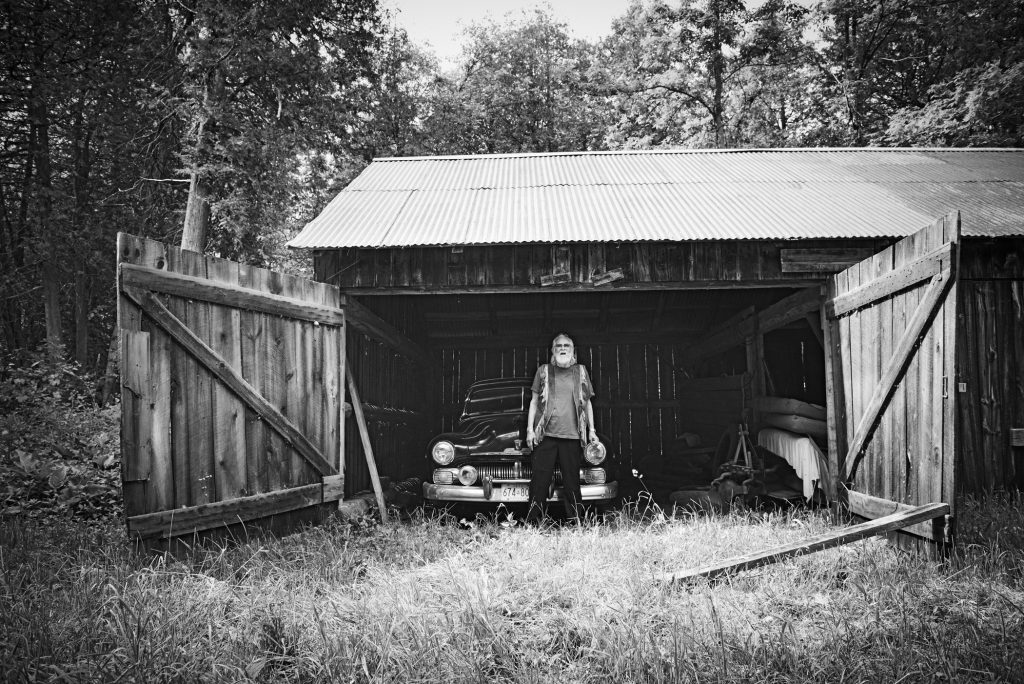
We sat down to speak at his ranch, Hawkstone Manor, during a brief recess from the photo shoot.
I wanted to start off by hearing about your formative years in Arkansas:
Alright, I’ll tell you what – Northwest Arkansas is a wonderful place to grow up in. There’s parts of Canada that look exactly like Arkansas in the summer. I don’t think our winters are nearly as bad. It was wonderful. Growing up, seeing all the things. Country. You don’t learn nothin’, but when you go back, you like seeing all of it. I was asked once about drugs. I said, “Well, drugs for me are kinda like my home town – I don’t live there anymore but I don’t mind going back for a visit every now and then.”
You studied at the University of Arkansas? Straight through for four years?
Well, it took me five and I didn’t graduate. I still have half a semester. I changed. I went from arts and science to education.
Is this true – I’ve heard you wanted to be a phys-ed teacher?
What I wanted, I may not have gotten. I wanted to teach high school girls, but I don’t think they were going to let me do that.
What do you think shaped you more, your time spent in Arkansas or living in Canada?
Canada. I left Arkansas when I was in my early twenties. I’ve been here fifty-six years. Canada has been, and still is, the promised land.
I spotted your broken-down tour bus outside. When were you primarily in that? The 1960s? 1970s?
Yep, we put that together in the 1960s and drove it all through the 70s and parts of the 80s.
Could you tell me something that happened on that bus that you may not have told anyone?
Well, I don’t wanna drop names, else they’d have to go in hiding. The statute of limitations may not be out on some of that stuff. No, there have been a lot of heroes on that bus. Big time heroes. A few parties – wild, I’m telling you what. They always used to ask me in interviews, they’d say, “Ronnie, what about them orgies?” “Orgies? What in the hell y’all talking about. We didn’t have any orgies, for chrissakes.” Nasty. We might have had fourteen or fifteen people in love, a time or two in that bus, but no orgies.
It was a time for free love, after all.
That was the 60s, boy, and the 70s got a little loose. I’m not kidding you. It was a boy’s dream, cos those girls would come on, baby. They’d come on heavy in the sixties and from then on. They were something else. They wanted freedom. They were tired of being held back. It was wild.
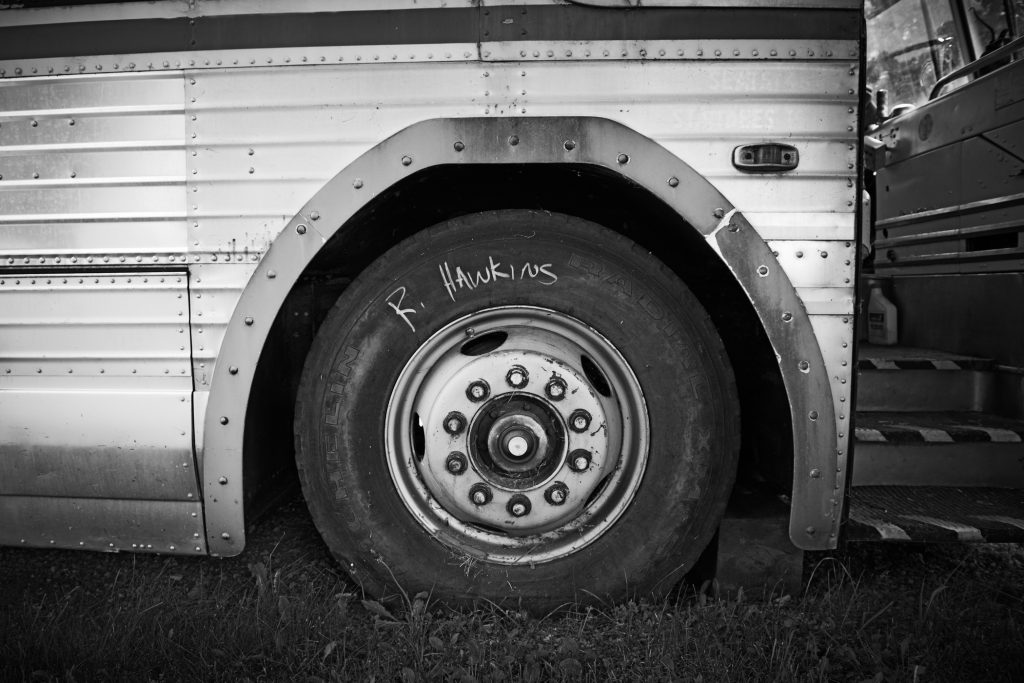
You were on Roulette Records?
I was on Roulette, for several years. That was such a great, interesting story. Morris Levy. I don’t know if you’ve heard of the notorious Morris Levy? [Roulette’s founder and owner]
Infamous.
I got to meet him in person and I loved that guy. Man. He was something else. He would have probably made me a superstar if it hadn’t have been for that disc jockey convention when they got busted. Payola. 1959. It was right in the middle of when he was promoting me. Every record company had a big problem there for some time.
What time in your life, what period as a musician, do you look back upon with the most fondness?
The fondest was when we first played Le Coq d’Or, on Yonge St. We had lineups every night. Seven o’clock at night, we had a lineup.
How many nights were you playing?
Six nights. We’d play Toronto or we’d load up and head to Port Dover or Grand Bend. There were three or four places that we went to, but Port Dover was my favourite.
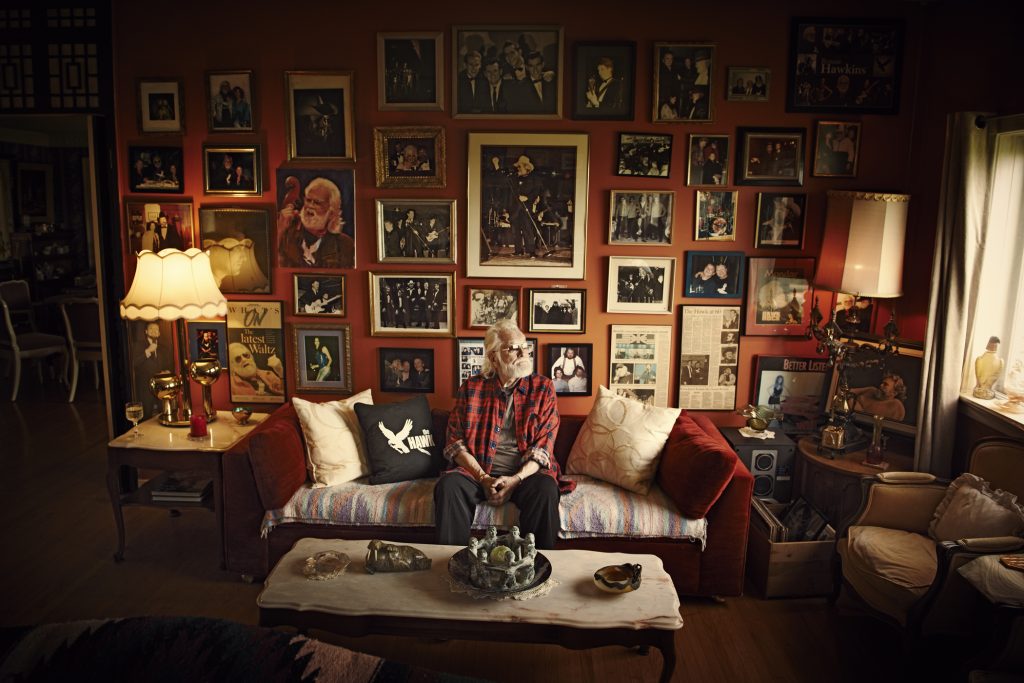
As an American transplant in Canada, what does Canada mean to you?
I’ve been to twenty-five or thirty countries, playing here and there, and some of them are beautiful, but they ain’t got nothing on Canada. I mean, my goodness, Canada’s got the land, the water, the natural resources, and they’ve got the loveliest girls on the planet.
I was waiting for you to mention the women.
What is better than that for an old country boy?
You seem to have had your fair share of vices, but women seem to be number one.
Oh my gosh. Women were the reason we tried to make it in music. Girls went for those musicians. Boy, once I found that out I decided to stay in music. The girls, I’m telling you what, they came around – they still do. Music gets ’em. In the early days it would really get ’em – it was the start of rock and roll and those little ol’ girls would line up. It’s a wonder I didn’t wind up in the penitentiary. I toured with Bo Diddley and there was a big difference between me and Bo. At break time we’d both grab a little girl and take ’em outside. I’d back one up against the building, walk up and put it in, but Bo Diddley would put it in, and then walk up to her. Oh, Bo. He’s gone now, but boy we had some laughs.
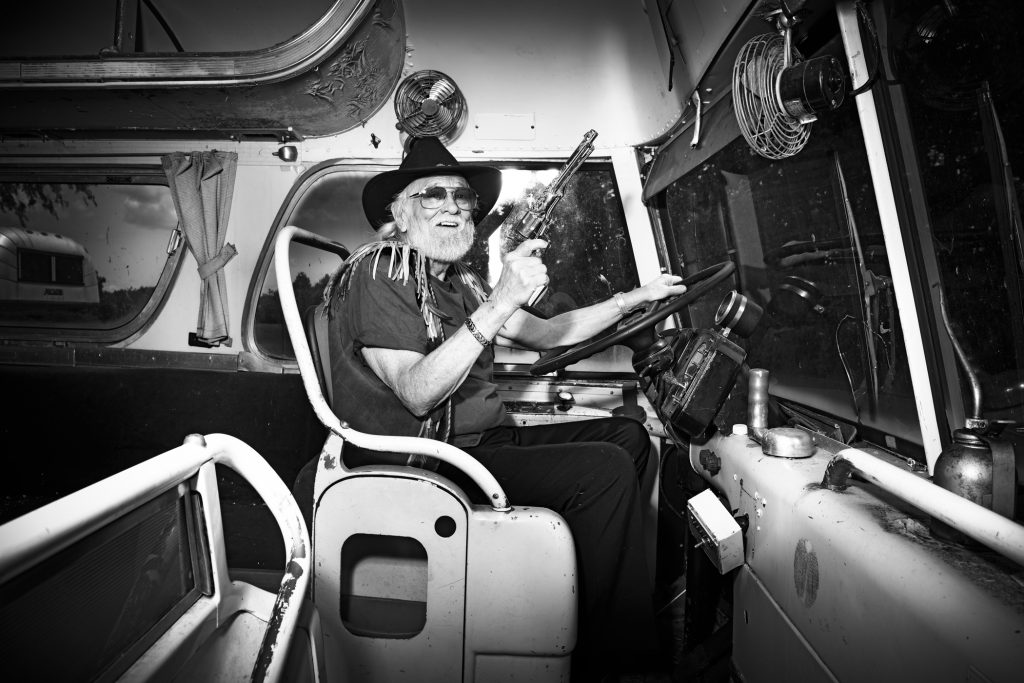
You’ve helped build so many careers, with people coming up around you, like The Band.
I’ve heard that all my life. Why did I have such unbelievable bands? I paid a hundred dollars more than anybody else in the bar business paid their bands. Also, I only travelled three months out of the year. I stayed in one spot: Le Coq d’Or. Things were that good then. Oh man, things were wonderful. Unbelievable. I could put great bands together. I’d just see somebody that can do something good and think, boy, I wish I could do that. What I try to do is get five or six of them type of guys in my band.
One of those that you helped was the actress Beverly D’Angelo. She was auditioning for you as a singer…
At the Nickelodeon. She was eighteen years old. She was a hot little thing. Funny and talented. Boy, was she funny.
After her audition she quoted you as saying, “Stick with me honey and I’ll have you fartin’ through silk.” Does that ring any bells?
She said that on the Johnny Carson show! He didn’t beep it or nothing. She was so talented. She could have done anything, but there are politics in movies – and in music. That was the drug period there and everything was going on. I let ’em know no drugs, no cocaine near anybody, and I said, “If you’re gonna smoke a little, don’t smoke near the club.” It was still illegal as hell to have grass, in those days.
Even in Canada?
Before they changed the law. You might as well have had heroin as grass, so you had to be real careful. Beverly used to sing with a friend of hers called Nancy, and one time they came to me and said, “Ronnie, a friend of ours in here, a dope dealer, has pure cocaine and before he cuts it we’d like to have one little spoon.” Remember them spoons they used to carry around their necks? They said, “Do you care if we try one little spoon of that real good, uncut stuff.” I said, “Are you serious? What they hell, go ahead.” So when she and Nancy came back in they had, tied around their necks, one each of those big soup spoons that fits a whole bowlful. That’s the kind of joke she used to pull, which was funny at the time.
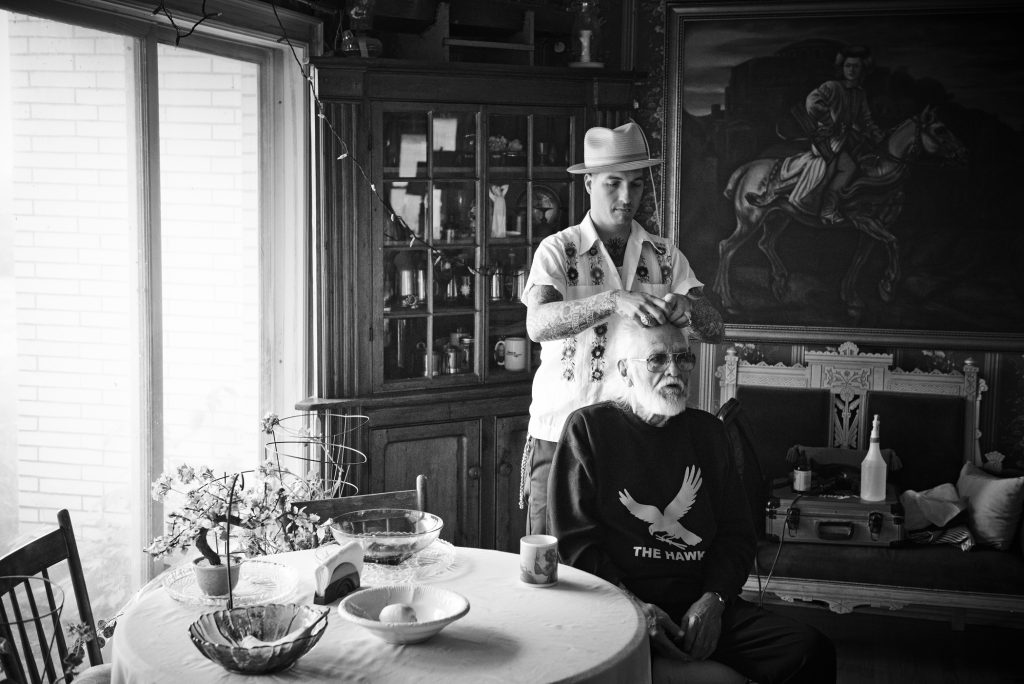
Who do you think you had the most influence upon?
Aw, most people influenced me. I was just lucky enough to play with them people. When you think of some of the people that have been in my band, they’re superstars. Levon Helm. He was a talent you wouldn’t believe. I was just with Robbie Robertson. He’s half-Indian and half-Hebrew. The Hebrew side is managing the Indian side and they’re doing real good. He’s doing well. He’s big time, Robbie is. I’ve been lucky, having all those cats help me. David Foster. He’s some kinda genius, man, I’m telling you.
He did an interview and they asked him about his bands and who he’d been with. He said he’d learned more in the Ronnie Hawkins band than in all the other bands put together. Except, he said, it had nothing to do with music.
Ronnie Hawkins School
…of hard knocks.
What record of yours has the most personal meaning to you now?
Well, I think the one that means the most, the strongest in the lyrics, is Days Gone By. An Arkansas boy wrote it and I recorded it with The Band – Levon and them – in Woodstock. Was about getting together with the old boys, just one more time.
At this point in our conversation Ronnie burst into nostalgia-tinged song, singing about those “Days Gone By” for nearly a minute and a half.
…I’d bet there are fifty of my musicians who are dead now. Lot of the big ones. Levon, Richard Manuel, Ricky Danko, King Biscuit Boy.
Too many, too young.
Way too young. I know the drugs had to do with a lot of it, but still they died too young.
Are you surprised to have outlived so many?
Nobody can believe it. I was dead, ten or twelve years ago. Pancreatic cancer. They gave me ninety days to live. We came back here and partied. God almighty. We had bands singing. Whiskey, dope, everything. They were filming it. They were going to film me until I died. Finally they had to call it “Alive and Still Kicking” cos I didn’t die on ’em. Pissed the film crew off as they had to change the ending. Shit, it cost them money.
You are sat with me wearing your Order of Canada medal. What does it mean to you?
Yeah, I wear it to sleep. I wear it in bed at night. It means more than anything you could ever get. I am probably the biggest fan of Canada that there ever was. Me and Stompin’ Tom Connors. If you said something bad about Canada to him, he’d be liable to fight you. Canada has been such a wonderful place. The timing worked out beautiful for me, because when we landed rock and roll was just starting. No rock and roll bands, no nothing. We was about the only ones that was even trying, so we chiseled out a real good circuit, you know, for the times, and it kept getting better, cos they started playing rock and all this shit. We got known, got some albums out and a few in the top ten here. Things were real good. We were popular on Yonge Street and that was good enough for us. It’s the promised land, if you wanna work and hustle.
It’s been said that you’re not that keen on music anymore – that you’re burnt out musically. Is that true?
Some good friends of mine, I thought was friends, took me for every penny I had. We tried one more big venture and they fooled me. I could have retired at fifty. I had buildings, bars, everything. That’s the past, but I had to keep playing and, after awhile when you’re forced to play more than you want to, you grow tired of it. You get tired of answering the same old questions, travelling to gigs, the sound checks. Burnt me out a bit. I hardly listen to music at all. I do meet and greets, and don’t mind that. I answer questions and tell lies. But to play a ninety minute gig, I have to have four long days of rehearsals in my barn. That’s a lot.
Is there to be another gig?
In Hamilton. They said I played this venue there twenty some years ago. I can’t remember anything, anymore. My mind is gone.
